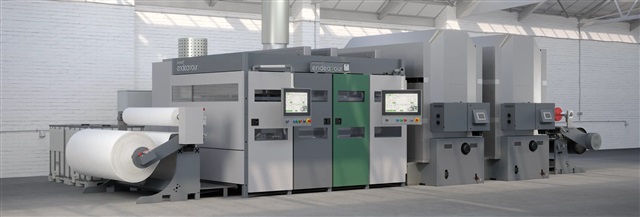The textile industry ranks among the foremost contributors to environmental pollution, accounting for 3% of worldwide carbon dioxide emissions and standing as the second-largest source of industrial global wastewater contamination.
Cambridge, UK-based clean technology company Alchemie has opened its first-in-market digital textile dyeing production and demonstration hub in Nantou, Central Taiwan. It marks a major milestone in the firm's mission to revolutionize the environmentally damaging textile industry.
Alchemie's new facility, which focuses on woven polyester fabrics, showcases the company's flagship Endeavour digital dyeing technology – a transformative solution that drastically reduces the carbon footprint and waste associated with conventional dyeing processes.
"In light of the global fashion industry's staggering contribution of 2.1 billion metric tons of carbon emissions, equating to over 3% of global emissions, there is an urgent need for action," said Dr. Alan Hudd, Founder and CEO of Alchemie Technology. "As the world increasingly prioritizes environmental conservation, energy efficiency, and carbon reduction, there's a growing demand for low carbon dyeing technology."

Credit: AFP
Alchemie's Endeavour process facilitates a transition from energy-intensive wet dyeing to a dry, digitally controlled system. This innovation results in an extraordinary 85% reduction in carbon emissions and up to 95% decrease in wastewater, addressing the textile industry's reputation as the second-largest cause of industrial global wastewater pollution.
At the core of the Endeavour technology lies Alchemie's patented piezoelectric nozzle system, which provides unparalleled precision - achieving 100-micron registration of 1.2 billion droplets per linear meter of dyed fabric. This level of accuracy ensures the highest quality results, eliminating the need for excessive dye and water usage associated with conventional dyeing methods.
The opening of the Taiwan facility marks a pivotal step in Alchemie's ambitious 2024 roadmap, which includes the development of in-market production solutions for cotton woven, cotton knits, and polyester-elastane fabrics. This comprehensive approach aims to provide a sustainable digital dyeing alternative across the diverse textile landscape.

Credit: Alchemie Technology
"With the opening of our new production and demonstration hub in Taiwan, we are poised to forge partnerships with leading brands and textile players to unlock greater business opportunities and sustainability," Hudd added. "These partnerships are not only about enhancing return on investment but also about driving tangible environmental benefits."
Hudd also emphasized the significance of their Discovery lab system, designed for fabric trials. This platform facilitates experimentation with various fabrics, crucially supporting production processes by determining optimal settings for different materials.
When addressing potential challenges, particularly regarding the technology's adaptability to different fabrics, he highlighted ongoing advancements. For instance, the company is transitioning from woven polyester systems to knit systems. This evolution reflects a commitment to scalability and innovation, ensuring that even high-stretch knits can be effectively processed on a production scale.
Furthermore, sustainability emerged as a central theme in the discussion. Hudd outlined ambitious plans to shift towards natural fibers and enzyme-based dyes, aiming to reduce reliance on petrochemical-based products.
While acknowledging the time and industry cooperation required for this transition, he expressed confidence in achieving significant milestones within the next five to ten years. Despite potential challenges such as maintaining quality and managing costs, the CEO emphasized the long-term benefits and scalability of sustainable practices, suggesting that any initial increased costs would be offset by economies of scale in the future.




